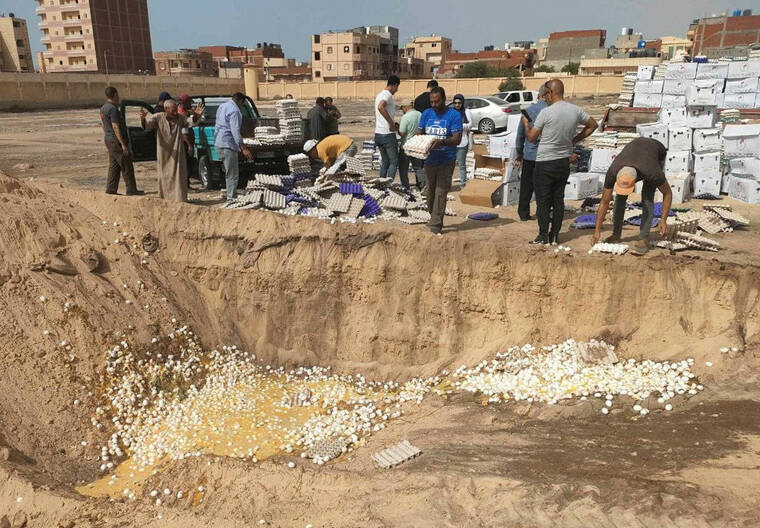As Rafah offensive grinds on, hunger in Gaza spirals
CAIRO — For weeks, the Gaza Strip’s southernmost city, Rafah, was one of the few places where desperate Palestinians could find some aid and food. Bakeries sold bread; fuel powered generators; markets were open, if expensive.
But since Israeli forces began an incursion in the city this month — effectively closing the two main crossings where aid enters — Rafah has become a place of fear and dwindling supplies. Bakeries have shuttered. So have malnutrition treatment centers. The price of the firewood that many people now use to cook has doubled. Tomatoes, cucumbers and peppers have grown so expensive that they are sold by the piece, not by the kilogram.
Families hide what canned goods they still have. They eye their emptying sacks of flour, calculating how long they will last.
“There’s always something missing in the tent,” said Ahmed Abu al-Kas, 51, who is sheltering in Rafah with his family. “If we have bread, we don’t have water. If we have firewood, we don’t have some basic vegetables.”
Although international aid agencies cannot officially declare whether Gaza meets the technical threshold for famine until more data is collected, the head of the U.N. World Food Program has already said famine has arrived. Even if the floodgates open to aid tomorrow, malnutrition experts say many more people will die — from starvation or from diseases as simple as diarrhea because their bodies are so weak and medical care is so scant.
“We have never, ever seen anything like this anywhere in the planet,” said Janti Soeripto, president and CEO of Save the Children U.S.
Usually, aid groups explain, humanitarian crises affect a portion of the population, not everyone. In Gaza, “it is really the entirety of the population” that is under threat, “not just a subset,” said Jeremy Konyndyk, president of Refugees International.
Despite mounting pressure to withdraw from Rafah — including an order Friday by the International Court of Justice to halt the offensive — Israel says it must defeat Hamas battalions there and dismantle the group’s infrastructure. That includes tunnels Israel says enable smuggling from Egypt to Gaza.
Around 815,000 people have already fled Rafah, and more are likely to do so as Israel expands its campaign to the heart of the city.
Even before the Rafah operation, aid agencies said the amount of aid entering Gaza fell far short of what was needed. Before the war, around 500 aid trucks passed daily through Kerem Shalom and Rafah, the two main crossings into Gaza. But that figure has fallen by around 75% since Oct. 7 to around 119 trucks daily, according to U.N. data.
Aid officials and many donor governments, among them the United States, have blamed Israel for tightly restricting aid, including by blocking essential items and imposing a byzantine assortment of security restrictions at nearly every stage of the process. Delays have also come from Egypt, where most of the aid is collected before being sent on to Gaza.
The International Criminal Court’s chief prosecutor requested arrest warrants Monday for Israel’s prime minister and defense minister, accusing them of using starvation as a weapon of war, among other allegations. He also requested warrants for top Hamas leaders, on charges of crimes against humanity. Neither set of warrants has been issued.
Israel says it is doing its part, arguing that it must thoroughly screen cargo for anything Hamas fighters could use. It says enough aid is entering Gaza and has blamed aid groups for not distributing it faster to civilians — a charge aid officials reject, saying Israeli forces have made it exceedingly difficult to do so.
Israel said Tuesday that it had inspected and sent 450 trucks through Kerem Shalom on that day alone, faulting aid agencies for not delivering their contents. But aid officials said the pileup amounted to little more than political theater, since the fighting on the Gaza side made it impossible to collect the supplies. In the meantime, people are dying.
And by the time famine is declared, “it’s already very, very late, and there’s already going to be widespread death,” said Kiersten Johnson, who directs the Famine Early Warning Systems Network, a U.S. government program that tracks hunger in global crises.
“We should not wait for an official famine declaration” to flood Gaza with aid, she said.
Although some food has arrived through three northern crossings into Gaza, it has not filled the gap left by the two southern crossings, Jens Laerke, a spokesperson for the U.N.’s humanitarian coordination agency, said last week.
The U.N. World Food Program said that 59 aid trucks had been delivered to warehouses in Gaza as of Wednesday from a U.S.-built temporary pier, and that, to the program’s knowledge, all the contents arrived intact. However, Palestinians intercepted and emptied 11 other trucks that were traveling through the central region of Gaza, the agency said.
“If the crossings stay closed, goods will be scarce, and prices will go up insanely,” said Nidal Kuhail, 30, a Gaza resident who has been sheltering in Rafah, noting that he no longer saw aid trucks rolling into the city. “The suffering will increase at every level, and we won’t find anything to eat or drink.”
Some fresh food is entering northern Gaza, where fears of a famine had been strongest. Residents interviewed last week reported seeing canned food, vegetables and flour in local markets. In recent days, trucks have also carried commercial goods into southern Gaza, filling markets with a wide variety of foods, said a U.N. official, who spoke on condition of anonymity because the official was not authorized to do so publicly.
But the war has left many Palestinians in Gaza without means to buy, especially when prices are far higher than they were before the war and have risen further since the Rafah operation.


